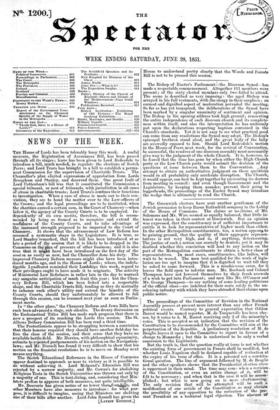The Bishop of Exeter's ParliamentLthe Diocesan Synod—has made a respectable
commencement. Altogether Ill members were present ; of the sixty elected members only two failed to attend. The scene is described as very imposing : the aged Bishop was arrayed in his full vestments, with the clergy in their surplices ; an earnest and dignified aspect of moderation pervaded the meeting. So far as has yet transpired, the deliberations of the Synod have been marked by a singular unanimity of sentiment and opinion. The Bishop in his opening address took high ground ; reasserting the entire independence of each diocesan church and its complete- ness within itself, and also the interpretation he has uniformly put upon the declarations respecting baptism contained in the Church's standards. Yet it is not easy to see what practical good can come from any resolutions the Synod may adopt. The Bishop's episcopal brethren stand aloof, and the great body of the laity are avowedly opposed to him. Should Lord Redesdale's motion in the House of Peers next week, for the revival of Convocation, be successful, the resolves of one diocesan assembly must necessarily give way to the judgment of the whole Church. It is, however, to be feared that the time has gone by when either the High Church party or the Low Church party would submit the decision of the questions at issue between them to the Convocation. Any attempt to obtain an authoritative judgment on these questions would in all probability only accelerate disruption. The Church, it would appear, can best be kept together by preventing its doctors from meeting in council : and even though Government and the Legislature, by keeping them asunder, prevent their going to loggerheads, the proceedings of the Exeter Synod may introduce the wedge that is ultimately to rend the Church.


























